- Home
- Farley Mowat
The Curse of the Viking Grave Page 2
The Curse of the Viking Grave Read online
Page 2
Alphonse shook his head. “We are well. And I have sent two sledloads of whitefish to Denikazi’s camp so that his people will not starve.”
Angus placed his hand on his friend’s shoulder. “Aye,” he said, “ye would do all ye can to help. But hark now. Your people must have nae mair contact with they Chips. I’ll see to it they get food. Influenza does na’ strike white men as it does the Indians. And I have some good news. The deer are coming south. Me and the lads wull give over trapping for the time being and wi’ a few of your men to help, we’ll hunt meat for Denikazi’s band.”
Alphonse’s news brought about a drastic change in the boys’ lives. Schooling stopped entirely and so did trapping. The following morning they set out for the country north and east of Thanout Lake where Angus had encountered the deer, leaving Angus to make the round of their traplines and spring all the traps. They had orders to travel hard until they were well into the herds and to kill all the deer they could in two days’ hunting. Then they were to cache what they could not carry and head for the Idthen Eldeli camps with fully laden carioles. Angus was to meet them near the sickness camp and deliver the meat to Denikazi’s people.
The boys encountered the first deer on the south shores of Kasmere Lake but, mindful of their instructions, they continued northeast down the Kasmere River until they were in the midst of the drifting herds.
They quickly made camp and for two days hunted caribou which congregated on the myriad little lakes of the district. Two of the boys would hide with rifles ready while the third drove his team out onto the ice and panicked the deer into headlong flight toward the ambush.
By the end of the second day some twenty deer had been killed and readied for carrying. The following morning the boys set out for the Idthen Eldeli camps, driving their laden sleds up the Kasmere River onto the broad ice of Kasmere Lake. Along its northern arm they came in sight of a few thin coils of smoke from Chipeweyan teepees which stood in the scrubby bush beside the mouth of the Kasba River.
They were met far out on the lake ice by Angus, who had been impatiently watching for them. He helped them cache their loads on a tiny islet from which he could ferry the meat to the camps of the sick and starving Chipeweyans.
“Hurry now, lads,” Angus ordered. “Ye must get back here wi’ another load by tomorrow for I’ve decided I must gang south myself. They traders and missionaries will pay little heed to what Penyatzi and Madees tell them but it may be they’ll listen to me. If they canna, or willna help, then I’ll hie on south to The Pas and report to the authorities. They Chips must have doctors and medicine. They’re in a terrible bad way, and if we dinna stop this epidemic it may sweep the whole country. Hearken now! When I’m gone ye’re to dump your loads on the ice half a mile awa’ from the camp. There’s one or two Chips still able to get around, and they must come for the meat. Ye’re not to go nigh the tents. But if it should come on so bad for they puir people that ye must go to their camp, Jamie wull be the one to go. Alone! Ye understand?”
Some two days later, Angus had ferried the last load of meat to the Chipeweyan camp. He said good-by to the boys and started the long trip—almost two hundred miles—to the nearest trading post. And he might have to travel another hundred and fifty miles to reach the first real settlement, at The Pas.
Throughout the rest of that month and into the first week of February the three boys, assisted by some of Alphonse’s Cree hunters, labored to help the stricken Chipeweyans. Load after load of meat was brought in by the hunters, while others of the Crees freighted firewood to the death camp.
But food and wood were not enough. The people of the Idthen Eldeli camp were so sick that most of them could no longer help themselves even to the extent of lighting fires or cooking food. Chief Denikazi himself was struck down, and though he could still crawl from his tent to hack off raw chunks of frozen meat, he too was fast growing weaker. Each time the boys came within sight of the huddle of pointed skin tents they saw fewer and fewer signs of life.
By the end of the first week in February they could stand it no longer. They made their decision, and that night in Alphonse Meewasin’s cabin at Thanout Lake they announced it. They were young, they argued to Alphonse, and in good health. They believed they could survive the disease even if they caught it. They were determined to move into the Chipeweyan camp and to do what they could to nurse the dying Indians. Awasin and Peetyuk would not allow Jamie to tackle the job single-handed. There was logic on their side, for one boy could not have coped alone.
Alphonse and Marie Meewasin gave their permission, but with a terrible reluctance.
“We will bring meat and wood each day,” Alphonse told them. “May the spirits hold your lives firmly in their hands, my sons.”
The squalor and misery of the Chipeweyan camps was incredible. For weeks no one there had had the strength to clean out the tents, or even to remove the dead. Moving from tent to tent, the three boys drew on one another for the strength to continue with their appalling task. Their faces hardened at the things they saw, and their stomachs turned over—yet they did not weaken in their resolve. The Chipeweyans had been their friends, and in the north there is nothing one will not do to help a friend.
Soon they were having some measure of success in their battle against the disease. Roaring fires and the strength of steaming meat soup brought renewed life to those Chipeweyans who had suffered the ravages of the disease and survived it. By the end of a week more than a score of men and women had passed the crisis and had rallied back to life—but an almost equal number had lost the struggle.
The boys got very little rest. All through the long winter nights two boys made continual rounds of the tents to keep the fires going, while the third stretched out in exhausted sleep. They thought of only one thing: when would help come? Each day they strained their eyes across the lake to glimpse the approach of Alphonse’s men, hoping that Angus Macnair and a doctor might be with them.
On a day in the last week of February, Alphonse brought a load of food to the meeting place and was met only by Jamie. The boy stood thirty yards away, as had been agreed, and he was so weary that he seemed to sag into the snow.
Alphonse’s face betrayed his fear, but he spoke calmly enough.
“Where are the others?” he asked.
“It’s Peetyuk,” Jamie answered. “He’s sick, and Awasin’s staying in the camp with him. Awasin’s all right and so am I. When is help coming, Alphonse? Is there no word from my uncle yet?”
Alphonse’s dark and handsome face grew darker still. He stretched out his hands as if he would close the gap between himself and the boy.
“You have much strength in you, Jamie,” he said. “Be strong now, for the news is bad.”
“Angus!” Jamie shouted. “Is he all right? Did he get through?”
“He did what he said he would, my son. Last night a messenger came from The Pas, a Cree sent by the police. He brought a letter to you from the police—but also he brought private news.
“When Angus reached Reindeer he found Penyatzi and Madees lying in a travel tent some distance from the trading post. They were very sick and none would go near them. So your uncle nursed Penyatzi and Madees. Madees still lives, although Penyatzi is no more.
“There was no help available at the trading post, so Angus traveled on. But he took the evil with him in his lungs. He got to The Pas sick. He was taken to the hospital and for a time they thought he would die. But he lives, my son, he lives. And he has sent this message to you through the lips of his friends the Crees. He says this: ‘Tell the boy he is to do as he sees fit, for he has shown himself to be a man, and a man may decide his own life for himself.’ ”
Alphonse finished talking and laid a manila envelope on the snow. As he walked away from it, Jamie ran forward, picked it up and tore it open.
The Pas, Manitoba
February 18th
Jamie Macnair
Macnair Lake
Manitoba
Dear Sir:
/>
Re: Angus Macnair
1. I have to inform you that your uncle, Angus Macnair, is hospitalized at The Pas with double pneumonia and serious complications. It is the opinion of the doctors that he will not be able to leave his bed for many weeks and he will be unable to return north for some months, if ever.
2. Since he has no funds he is being cared for as a welfare patient.
3. It is understood that Mr. Macnair is your legal guardian. Since he is not in a position to care for you the law compels me to instruct you to report yourself to the Child Welfare authorities in Winnipeg as soon as possible.
4. You will therefore return to The Pas with the bearer of this letter, Special Constable Peter Moiestie. Transportation by rail to Winnipeg will be provided for you from there.
5. Would you please inform Chief Denikazi and Chief Meewasin that the Department of Indian Affairs has the epidemic under advisement and will try to arrange a visit by a doctor when conditions warrant.
ROBERT OWEN, Sgt.,
i/c The Pas Detachment
CHAPTER 3
Angeline
SHOCK AND RAGE CHOKED JAMIE AS he finished the letter. He looked up, white-faced and hard-eyed.
“Listen to this, Alphonse!” he cried bitterly, and read the letter aloud.
There was a responsive anger on the Cree chief’s face. “So,” he said, “they will send a doctor—when conditions warrant! Then we will show him many graves. But you, my son, what will you do?”
“I’m staying!” Jamie yelled fiercely. “You can tell Constable Moiestie if he wants me he’ll find me in Denikazi’s tent—with five sick Chips. He can come in there and get me if he wants to try it.”
“Easy, my son. Peter Moiestie is a Cree. Have no fear of him. He will return south without you if that is what you wish. But you must think carefully of what you do, for it is in my mind that the police will send for you again.”
“There’s plenty of other things to think about,” Jamie replied more calmly. “There’s Angus being treated like a down-and-out. I’ve got to get money to take care of him—maybe for a long time. I can’t do that in an orphanage and that’s likely where they’ll put me if I go outside. But if I stay here I can go on trapping and, and…there’s the Viking relics! They’re bound to be worth a lot of money. And we can still go north for them! That’s it, Alphonse, that’ll solve everything!”
Alphonse stepped nearer and nodded his head thoughtfully. “Perhaps you are right, my son. But you must remember that you are a white man, and the whites will not let you go so easily. Do not forget that they are your people.”
Jamie clenched his hands, wadded the letter into a ball and flung it onto the ice. There was bitter defiance in his voice.
“My people? They aren’t mine! They’d let the whole lot of you die without lifting a hand to help. Don’t call them my people, Alphonse!”
Adroitly Alphonse changed the subject.
“The decision is yours to make,” he said soothingly. “Your uncle left you free to do as you think best. But now, if the Idthen Eldeli can spare you, it would be wise to bring Peetyuk back to your cabin where he can be better cared for.”
Mention of Peetyuk quieted Jamie’s anger. “I guess you’re right, Alphonse. The Chips can get along without us now, so long as you keep bringing them wood and meat. And Peetyuk is pretty sick.”
The next morning as Jamie and Awasin harnessed the dogs to the carioles, Chief Denikazi appeared from his tent, still weak but holding himself stiffly upright in the cold wind. He said nothing until Peetyuk, who was half delirious with fever, had been carefully placed in Awasin’s cariole and well wrapped in deerskins. Then he grunted to attract the boys’ attention and, without even looking at them, muttered a few words.
“What’s he saying?” asked Jamie, who did not understand Chipeweyan.
“He says: ‘We will be here,’” Awasin translated.
“Well, that’s not much of a thank-you speech, considering all we’ve done.”
Awasin glanced sharply at his friend and his usually gentle voice had an edge to it.
“Sometimes I think you do not know us at all, Jamie. What use is a speech made out of many words? Denikazi means that as long as there are Chipeweyans in this land, we will have friends. Is that not enough?”
Jamie fumbled with one of the traces and muttered: “I’m sorry, Awasin. Tell him we were glad to help his people.”
“There is no need, Jamie. He knows. Now let us go.”
A few minutes later, the boys looked back to see the old Chipeweyan still watching them. He grew small in the distance before he turned his back. Slowly Denikazi walked toward the straggling row of deerskin tents. Many of them now stood empty to the winds, while the people who had built them waited in rigid silence under the great snowdrifts—waited for spring and the thawing of the ground so that they could begin the long sleep of the dead.
The boys made the homeward journey at a good pace, for the two teams had been strengthened by the addition of Peetyuk’s dogs. Because of the danger of infecting the Crees they swung wide around the camps at Thanout Lake, but as they passed the cabins most of the Crees came out to wave and shout greetings to them from a distance. Just after dark the carioles swung down Macnair Lake.
Jamie and Awasin had expected to find a deserted cabin, frosty cold after the long weeks it had stood empty. They were startled to see a soft gleam of yellow light from the two windows. They looked quickly to see if there were a sled and dogs in the yard, but there was nothing. It was all very mysterious, for it had been agreed that they should have no contact with the Crees until Peetyuk was completely over his sickness. And yet, who else but one of the Crees could have visited the cabin?
They had not long to wait for an answer. As the dogs hauled the carioles up off the lake ice they broke into a short chorus of howls, and the cabin door swung open. Framed in the lighted space was the figure of a girl. She held a kerosene lantern in her hand and it illuminated her pretty oval face and reflected the gleam of her long, black hair.
“Angeline!” Awasin cried in amazement. “What are you doing here? You must leave at once! We have Peetyuk with us and he has the lung sickness. We must get him inside. Pick up your things and go!”
“Bring him in then, quickly,” the girl replied calmly. “The cabin is ready. There is hot soup on the stove. And do not tell me what I must do, brother, for our mother has permitted me to come, and our father has brought me here himself. Hurry with Peetyuk. Do not stand there like two frozen owls.”
Too astonished to argue, the boys did as they were told. Not until some time later, when the sick boy had been freshly clothed, put into his bunk, fed a little soup and had drowsed off into a feverish sleep, did they have time to question Angeline. The girl, who was busy washing dishes and setting pots of water to boil, was perfectly aware that she had them at a disadvantage. It was not until Awasin finally abandoned his big-brother attitude and pleaded with her for an explanation that she turned, smiling, and told her story.
“You have forgotten, brother, that when I was at mission school as a little girl there was the lung sickness there. I had it, but it did me no harm. When our father told us that you were coming here with Peetyuk I spoke of the need for someone to care for him, and our mother understood. Father agreed, and he brought me here this morning. It is a good thing I came. Look at you two! A bear would turn you out of his cave, you smell so bad! Here is hot water, and here clean clothing. Unless you would sleep outside with the dogs tonight, make yourselves clean!”
There is no false modesty amongst northern peoples, and Awasin bowed to the inevitable meekly enough. In a moment he had stripped off his filthy clothing and was washing himself in a bucket of scalding water, sighing with pleasure as he did so.
But being city-raised, Jamie found the situation more difficult. Finally he picked up a bucket and went out to the unheated lean-to shed at the back of the cabin where they stored things which would not be hurt by frost. Nobody said an
ything to him as he went out into the bitter cold, but as he stood shivering in the shed with the hot water sending up a great cloud of steam about him, he distinctly heard the sound of giggling from the cabin, and despite himself he blushed.
“Darn girl,” he complained to himself, careful to keep his voice low. “She’s got no business here!”
But an hour later as he lay back on his bunk, clean and freshly clothed in a shirt and trousers Angeline had laundered that afternoon, he found that his indignation had mellowed considerably. He was even able to thank Angeline in a moderately friendly manner when she brought him a mug of coffee and asked for his moccasins so that she could mend their worn-out soles.
Peetyuk was indeed very ill and the long trip in the cariole had done him no good. It was several days before the fever left him. During those days Angeline cared for him with deep solicitude. She was merciless with Jamie and Awasin. Although she fed them well and saw to it that their ragged trail clothes were neatly repaired, she drove them to tasks they would normally not have bothered with. She made them scrub the grimy cabin from end to end. She forced Jamie to spend a whole day making more shelves where clothing and other oddments of gear, which had lain helter-skelter anywhere, could be stowed neatly away. She sent Awasin off to snare snowshoe rabbits which, she said, made the best soup for sick people.
Despite the way she took control, she never raised her voice and never appeared to be giving orders. She was always demure, soft-spoken, smiling—and utterly inflexible. Jamie was baffled by her. Most of the time he resented her presence, but when he chose to be honest with himself he was grateful for the way she cared for Peetyuk and so eased the burden which would otherwise have fallen on himself and Awasin.
Although Angeline made the boys do what she required, she also saw to it that they had a chance to rest and regain their strength after the ordeal at the Chipeweyan camp. Cooking and nursing were nothing new to her for she had done both of these at home and at the mission school. But it was almost as if the Macnair cabin had become her own house and she felt a tremendous (if carefully concealed) pleasure in seeing to the domestic details. Nor was she unaware that Peetyuk, growing stronger every day, watched her busy activities with open admiration.

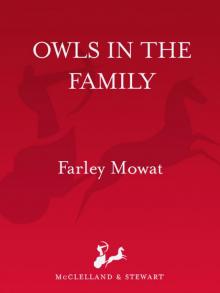 Owls in the Family
Owls in the Family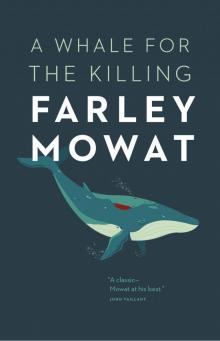 A Whale for the Killing
A Whale for the Killing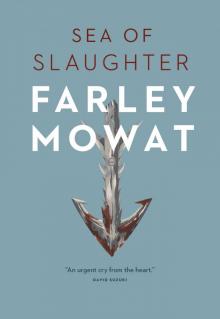 Sea of Slaughter
Sea of Slaughter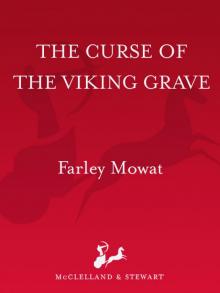 The Curse of the Viking Grave
The Curse of the Viking Grave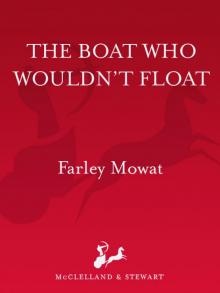 The Boat Who Wouldn't Float
The Boat Who Wouldn't Float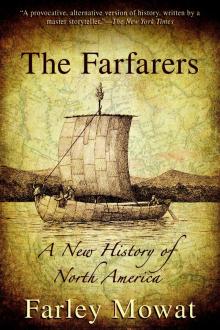 The Farfarers: Before the Norse
The Farfarers: Before the Norse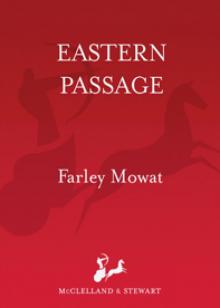 Memoir
Memoir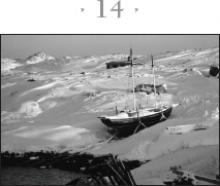 Bay of Spirits: A Love Story
Bay of Spirits: A Love Story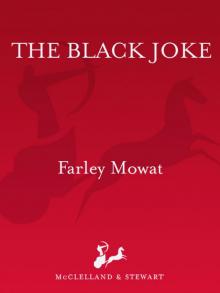 The Black Joke
The Black Joke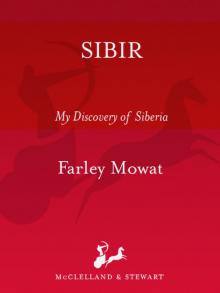 Sibir: My Discovery of Siberia
Sibir: My Discovery of Siberia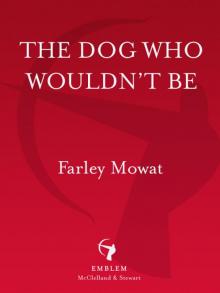 The Dog Who Wouldn't Be
The Dog Who Wouldn't Be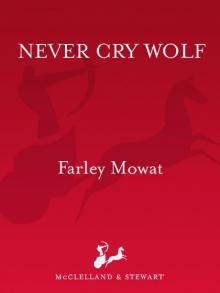 Never Cry Wolf
Never Cry Wolf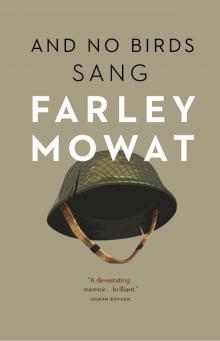 And No Birds Sang
And No Birds Sang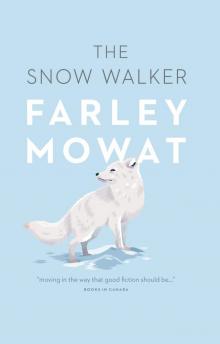 The Snow Walker
The Snow Walker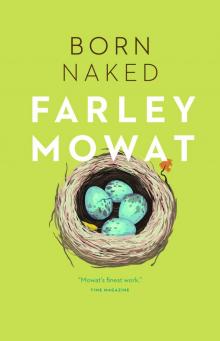 Born Naked: The Early Adventures of the Author of Never Cry Wolf
Born Naked: The Early Adventures of the Author of Never Cry Wolf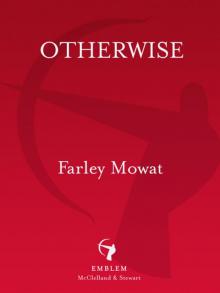 Otherwise
Otherwise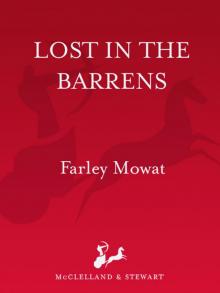 Lost in the Barrens
Lost in the Barrens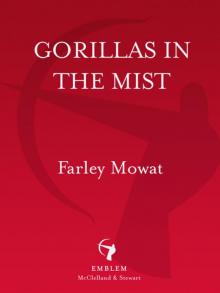 Gorillas in the Mist
Gorillas in the Mist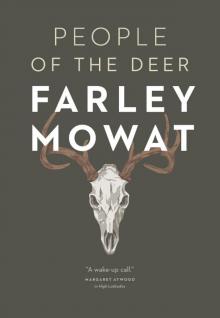 People of the Deer
People of the Deer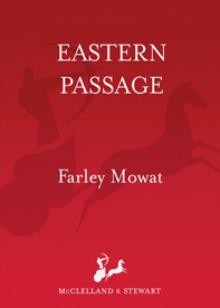 Eastern Passage
Eastern Passage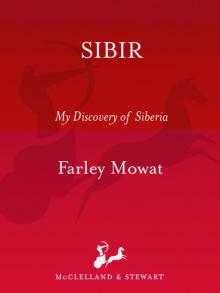 Sibir
Sibir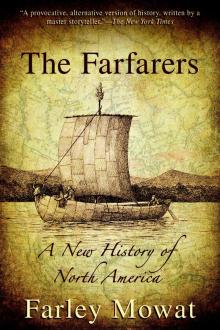 The Farfarers
The Farfarers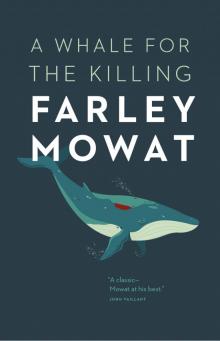 A Whale For The Killing (v5.0)
A Whale For The Killing (v5.0)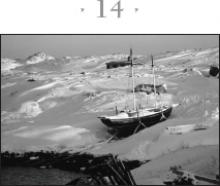 Bay of Spirits
Bay of Spirits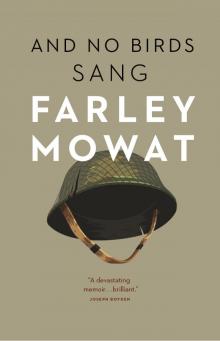 And No Birds Sang (v5.0)
And No Birds Sang (v5.0)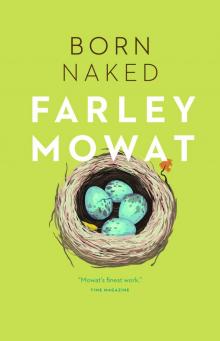 Born Naked
Born Naked